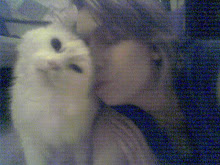The Mind/Body Problem: Philosophy or Religion?
My readings for my online class briefly mentioned the mind/body problem, so my instructor posted a question about it. The question was about Cartesian Dualism, which posits that the mind and body are two separate entities made up of different substances. Apparently, Vygotsky favors monism, which posits only the physical substrate of the body. I can see this because Vygotky and his colleague, Alexander Luria, were the founding fathers of neurophyschology, which examines the relationship between the brain and behavior. Everything can be reducible to brain functioning. It's reductionistic. However, this doesn't seem to mesh well with Vygotsky's stance that cognition is emergent. Hmm, I think I'm confused and might have to read back over this chapter again.
My professor posted this question and a few people responded with explanations of various philosophical stances on the mind/body problem. But, then a Catholic posted a ton of questions about where the soul fits in. Every other week, she makes references to Catholicism and the Catholic nuns who taught her in school. Since the Catholic nuns made such a big deal about the soul, where does the soul fit in with the mind and body? It is a trinity rather than a duality? I have thought about all this before, but I wasn't sure about posting an answer to her question. I think of the mind/body problem as psychology's way of addressing the question of the existence of a soul and God without actually outright acknowledging that this is what the mind/body problem is about. I think that the philosophers who posited dualism (e.g., Rene Descarte) were really just trying to state that there is a soul (i.e., mind, which is immaterial and survives the body in death), but there were questions about whether the mind (i.e. soul) had freewill or if God occasionally directed the mind (e.g., occassionalism, determinism suggests there is no freewill, but that God doesn't direct anything either).
Even though the psychologists are only stating the words mind and body, I see "mind" as a metaphor for "soul." I though about posting something of this respect to her question, but I actually tried and got a technical error. So I'm not going to attempt to address her question, I think most of the people online ignored it and consider it irrelevant.
One of the students online stated that he thought the field was moving from predominantly monist to dualist. I was pretty shocked, there must be something more about this philosophical question and how it relates to research and practice in education that I don't know about. I think holding certain views on this topic is relevant for the paradigm which organizes the predominate mode of thought in physchology and education. I believe we are moving away from the cognitive information processing paradigm (which holds that monism, materialism, reductionism, and determinism are true) and towards something else. Perhaps this emergentism, dualism, or whatnot. Anyways, the ideas I'm interested in peaked in the 80s and are currently in decline because they are focused on cognition (e.i, skills-based reading, impact of schooling on higher level thinking). Now I think people are more focused on social development, emotion, and culture.
(P.S. the spell check keeps wanting to replace the word "Vygotsky" with the word "bigot." Weird.)




1 Comments:
Somebody in the class just responded to her question! He stated that it fit with what he was taught as a Christian. I'm so amazed by how many people are Christians in the field of education. It was quite the opposite when I was in cognitive psychology. Anyways, he stated that he thought Cartesian dualism attempted to bring the soul into the realm of scientific study. Decartes postulated that the pineal gland was the seat of interaction between the soul and the body/brain.
He affirmed that her questions were good questions that he thinks many might have had these questions as they look at these ideas. I'm really pleased with this affirmation. It reveals the stark contrast between how education and the cognitive neuroscience or neuropsychology diciplines would have treated her question.
Post a Comment
<< Home